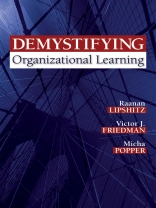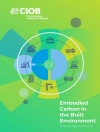This book presents a solid, research-based conceptual framework that demystifies organizational learning and bridges the gap between theory and practice. Using an integrative approach, authors Raanan Lipshitz, Victor Friedman and Micha Popper provide practitioners and researchers with tools for understanding organizational learning under real-world conditions.
Key Features:
- Tackles the problem of mystification: A clear message is presented that organizational learning and related concepts have been mystified in a way that is unnecessary and dysfunctional to both theory and practice. This book provides a unique set of tools for understanding, promoting, and studying organizational learning.
- Introduces an integrative theme that addresses three key questions: How can organizations actually learn? What is the key for productive organizational learning? When is productive organizational learning likely to occur? Answering these questions is the key to clarifying the conceptual confusion that plagues the related fields of organizational learning, learning organizations, and knowledge management.
- Illuminates organizational reality: All of the concepts presented in the book are illustrated through concrete case examples. Detailed analyses are provided of both successful and unsuccessful applications of organizational learning. In addition, examples of interventions to develop organizational learning are included to help managers and consultants.
Intended Audience: This book is designed for advanced undergraduate and graduate courses such as Organizational Learning, Knowledge Management, and Organizational Behavior in the departments of Management, Organizational Behavior, Psychology, and Sociology.
สารบัญ
Preface
Part 1: Introduction
Chapter 1: Demystifying Organizational Learning
The Mystification of Organizational Learning
Demystification
The Facets of Organizational Learning
Applying the Multi-Facet Model
How to Read This Book
To Sum Up
Part 2: The Multi-Facet Model
Chapter 2: Organizational Learning Mechanisms
Types of Organizational Learning Mechanisms
Off-Line/Internal OLMs
Online/Internal OLMs
Off-Line/External OLMs
Online/External OLMs
Mechanisms, Technologies, and Choosing the ‘Right’ OLM
Chapter 3: The Cultural Facet: The Key to Productive Learning
Cultural Islands of Learning
The Norms of a Learning Culture
Demystifying Culture and Organizational Learning
Chapter4: The Psychological Basis of Productive Learning
Psychological Threat and Psychological Safety
Organizational Learning as a Source of Psychological Threat
Defensiveness and Defensive Routines
Psychological Safety and Trust
Creating Psychological Safety
Commitment to the Organization
Chapter 5: The Context of Organizational Learning
Environmental Uncertainty
Task Uncertainty
Task Structure
Proximity to the Organization′s Core Mission
Organizational Structure
Chapter 6: Organizational Learning and Managerial Channels of Influence
Instituting OLMs
Tolerance for Failure
Commitment to the Workforce
Manager′s Behavioral Channels of Influence
Chapter 7: The Dissemination of Knowledge
The Problem of Dissemination
The Source of Knowledge
The Recipient of Knowledge
The Relationship Between Source and Recipient
Understanding Knowledge
Dissemination Mechanisms
Attributes of the Organizational Context
Demystifying Dissemination
Part 3: Applying the Model
Chap 8: Inside an OLM: Postflight Reviews in the Israeli Air Force
Learning Functions
Social and Control Functions
Psychological Functions
Psychological Safety and Learning Culture in a High-Threat Environment
What Can Managers Learn From Postflight Reviews?
Chapter 9: Is Training Organizational Learning?
Computer Chips International
Johnsonville Foods
Motorola University
Dell Learning
Bell Labs
Discussion and Lessons Learned
Chapter 10: High-Quality Organizational Learning: Why Do Some After-Action Reviews Work and Others Don′t?
Low-Quality After-Action Review
High-Quality After-Action Review
Chapter 11: Demystiying the Learning Organization I: The Case of Hewlett-Packard
HP′ Work Innovation Network (WIN)
The HPC Knowledge Management Initiative
Why Did WIN Die and the KM Inititative Live?
Demystifying the Learning Organization
Chapter 12: Demystifying the Learning Organization II: The Case of Chaparral Steel
Organizational Learning Mechanisms at Chaparral
Productive Learning at Chaparral Steel
The Contextual Facet
Conclusion
Chapter 13: Putting the Multi-Facet Model Into Practice
Background
Designing the Organizational Learning Process: An Action Science Approach
Ending the Formal Organizational Learning Intervention
Epilogue
Demystifying the Organizational Learning Process
Chapter 14: Before We Go…
References
Index
About the Author
เกี่ยวกับผู้แต่ง
Micha Popper is Associate Professor and the head of the Organizational Psychology Program in the Department of Psychology at the University of Haifa , Israel, is the former commanding officer of the School for Leadership Development of the Israel Defense Forces .He is the founder and director of the Center for Outstanding Leadership in Zikhron Yaakov Israel ; A scholar of the US Army Research Institute( ARI ) and has been a visiting professor at Simon Fraser University in Vancouver Canada His research and consulting concern organizational learning and the dynamics of leader- followers relationship and developmental aspects of leaders . He has a Phd from Tel –Aviv University (Organizational Behavior), MA from Tel-Aviv University and BA from the Hebrew University in Jerusalem . Author and co-author of five books on leadership and numerous articles in journals including The leadership Quarterly , Political Psychology , Academy of Management Journal , Military Psychology , Management Learning and Journal of Applied Behavioral Science.












